This talk was part of our internal training at OC Tanner Company, a functional programming boot camp that included sessions on Scala, Play, lambda calculus, and this talk - Why be functional?
This isn't really a transcript, more like a framework of ideas to discuss while each slide is showing. Sometimes the discussion ideas even have something to do with what's on the slide.
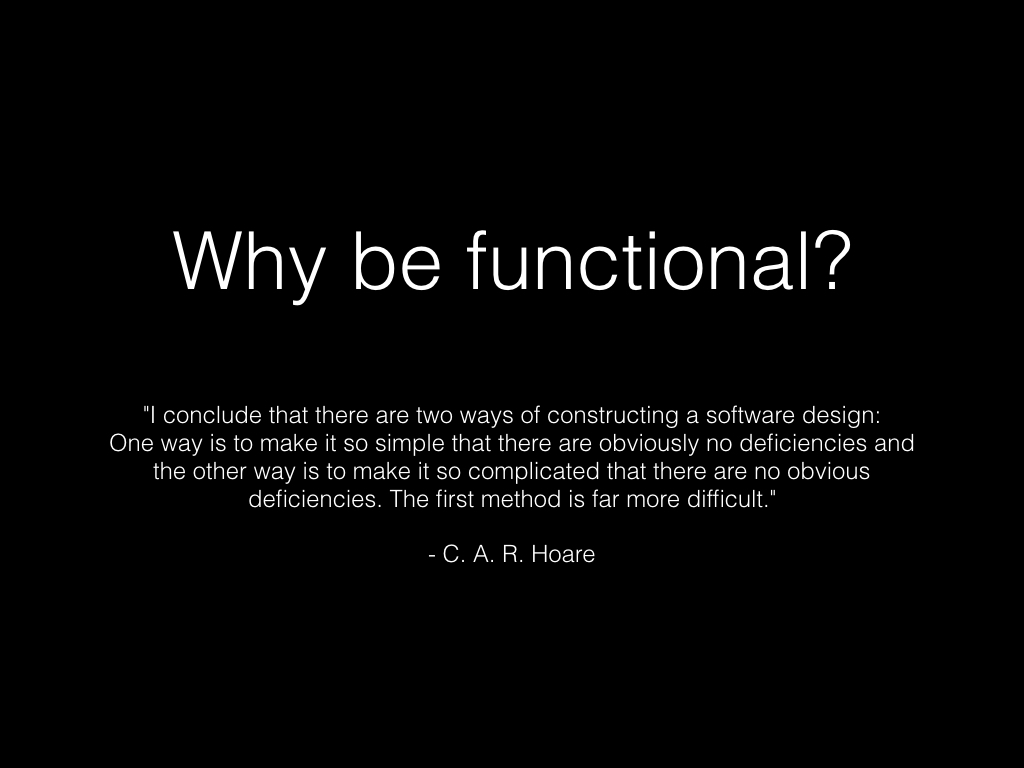
The goal of my talk is to convince you to do more functional programming. We'll start by looking at complexity, and in turn simplicity. Then we'll examine how our languages influence our design and even our thought process. Finally, we'll look at functional programming and how it meets the goal of managing complexity.
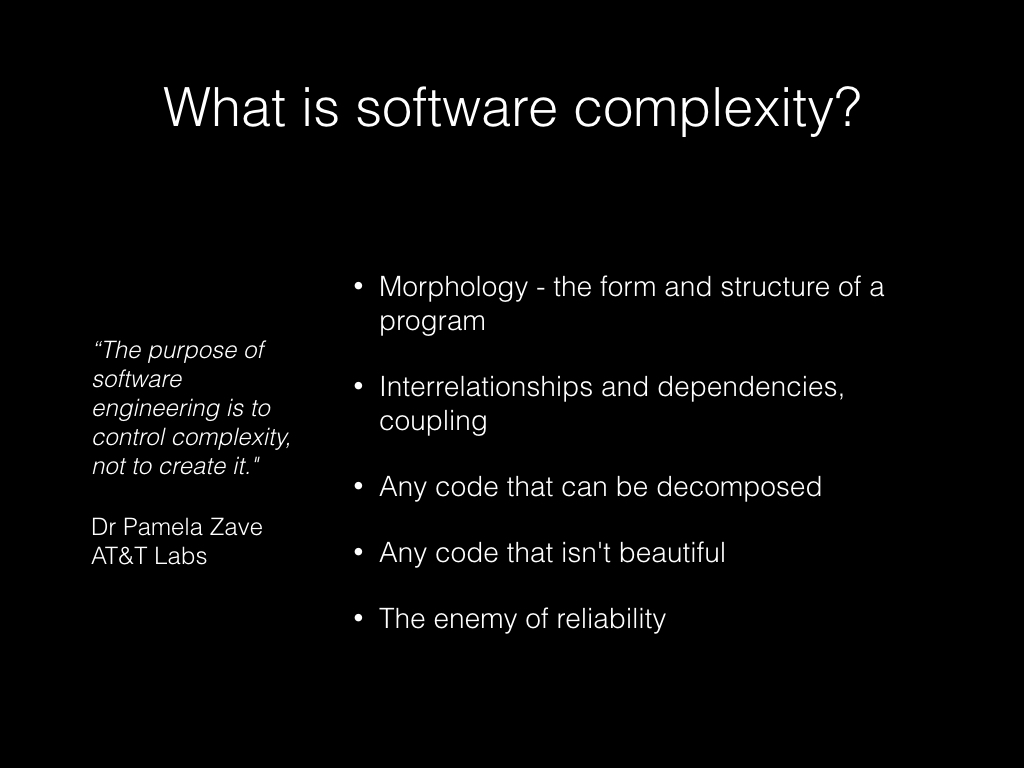
Complexity is the morphology of software - that is, its form and structure. All form and structure is complexity - we just accept some complexity.
Complexity is the interrelationships and dependencies of software components, how components are coupled. This is demonstrated by the impact one component may have on another.
Complexity is any code that can be, but hasn't been, decomposed into simple components.
Complexity is the part of our code that isn't beautiful. Beauty is the ultimate defense against complexity.
Complexity is the enemy of reliability. Tony Hoare says, "The price of reliability is the pursuit of the utmost simplicity."
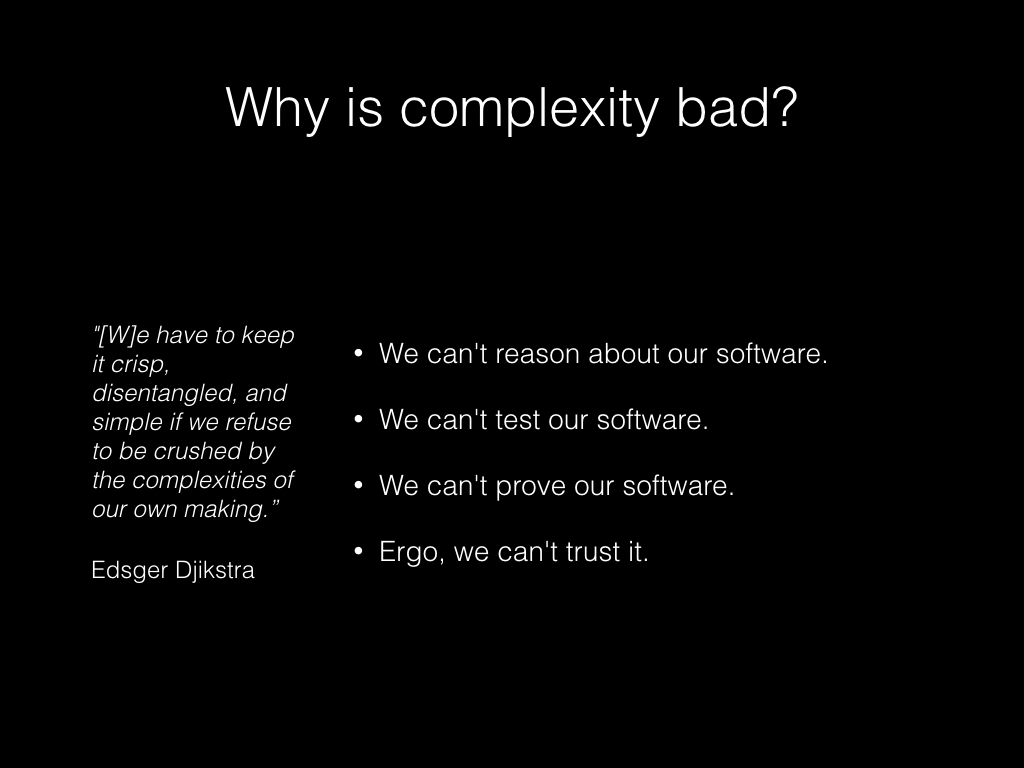
There are limits to our ability to reason about a system, and there are limits to our ability to build complex systems. Our ability to build complex systems far outstrips our ability to reason about them.
Testing is never 100% effective, but the effectiveness of testing decreases as the complexity of the software increases.
There are ways we can use formal reasoning - that is, mathematics and logic - to prove the correctness of a system. But proving the correctness of a system becomes magnitudes more difficult as the complexity increases. Proving correctness quickly becomes impractical, or even practically impossible. Not to mention that it's tremendously difficult to create a complex system that is correct.
If we can't reason about software, can't test our software, and can't prove our software, then we can't trust our software.
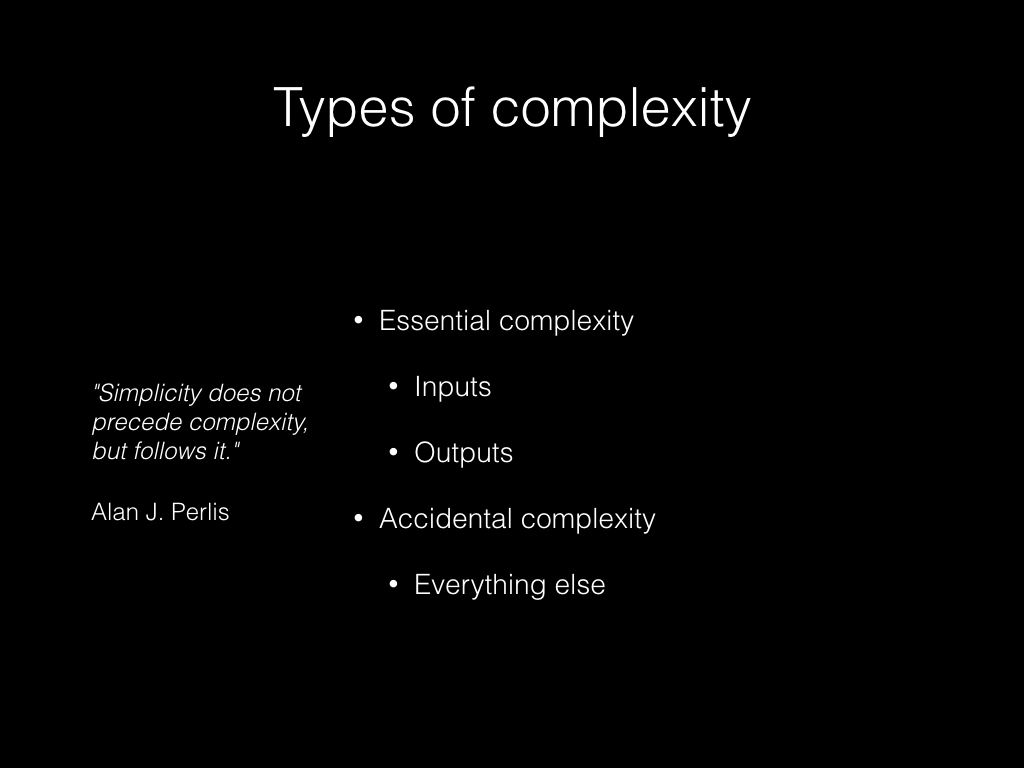
Essential complexity is the required inputs and outputs, and the business logic that defines the relationship between inputs and outputs.
Accidental complexity is everything else, including the program that implements the business logic.
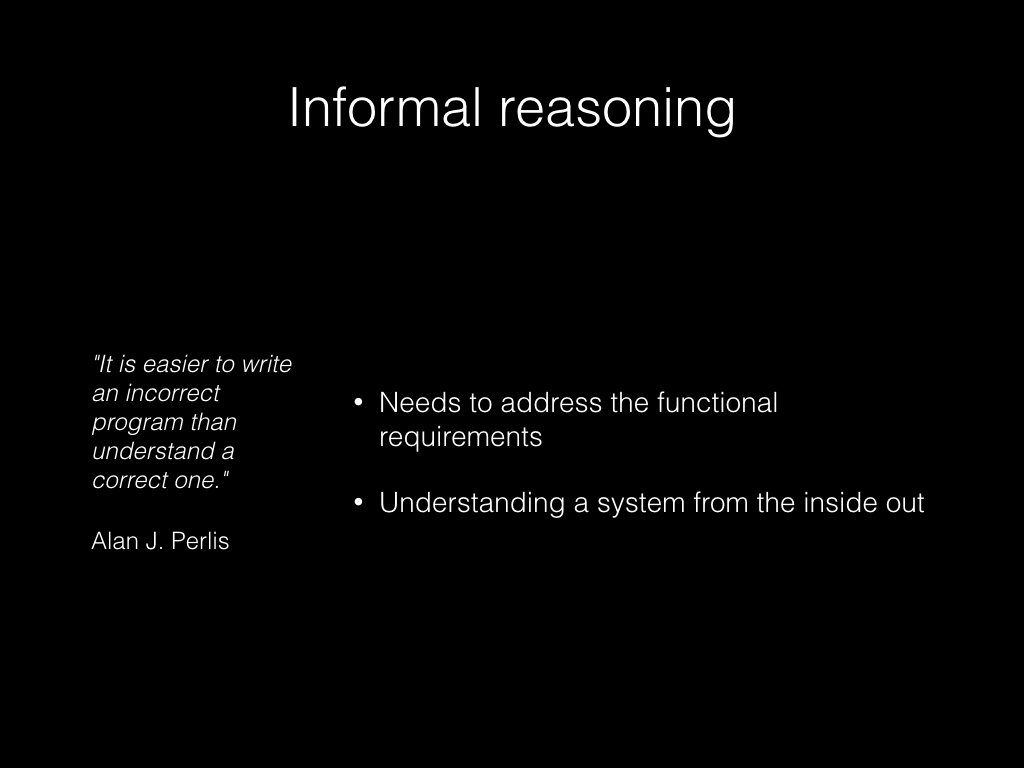
Informal reasoning is understanding how a program works, and why. Being able to translate what the program needs to do into how the program will do it.
Good informal reasoning will lead to simpler software. Complex software is difficult to reason about.
Complexity breeds complexity. A program that is difficult to reason about becomes more complex.
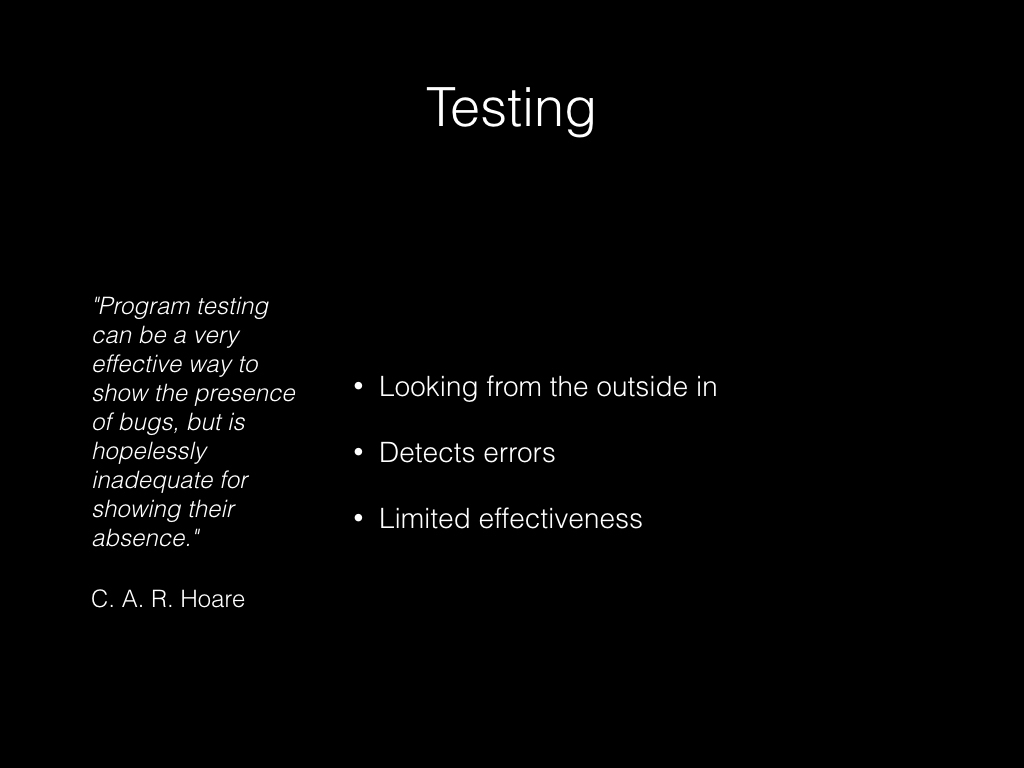
Understanding a system from the outside
Leads to more errors being detected
Some limits:
- Each test demonstrates correctness for only one set of inputs. (Property based testing is an exception.)
- Mutable state complicates testing drastically. A mere 24 bytes of state, 6 32-bit words, contains more possible states than there are atoms in the earth.
- Testing only demonstrates correctness in the code, not in the specification
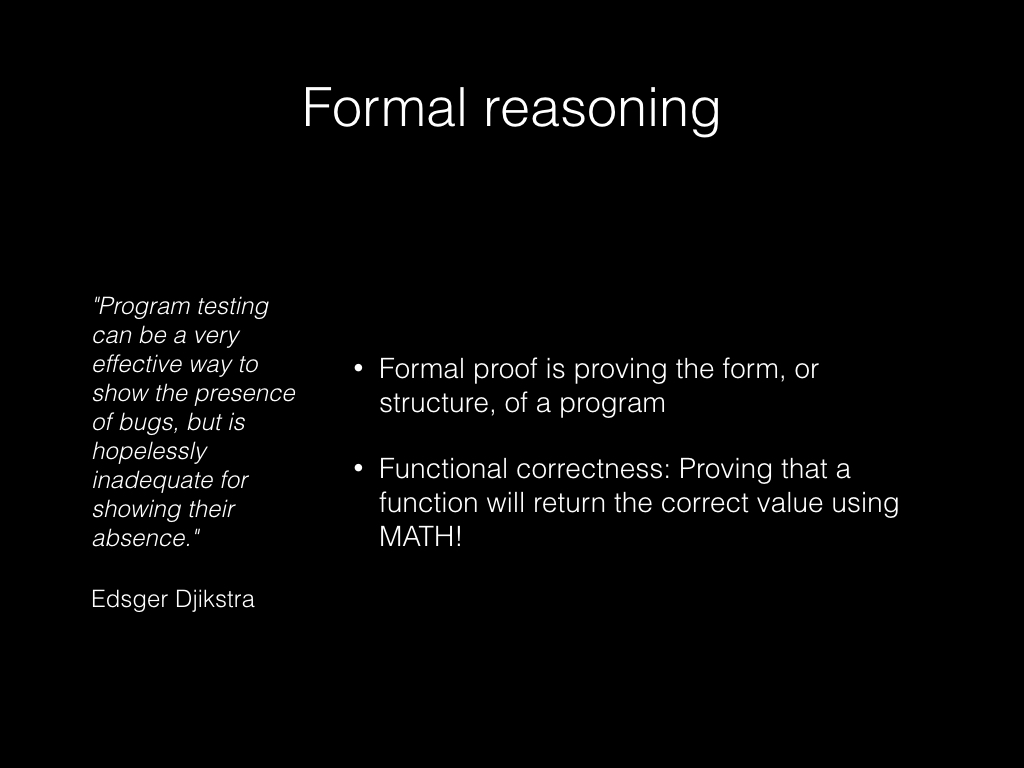
Methods for proving, mathematically, the correctness of a program exist, but they're outside the scope of this talk.
Formal proof of correctness can only be proven mathematically if both the algorithm and the specification are also given formally; i.e. mathematically.
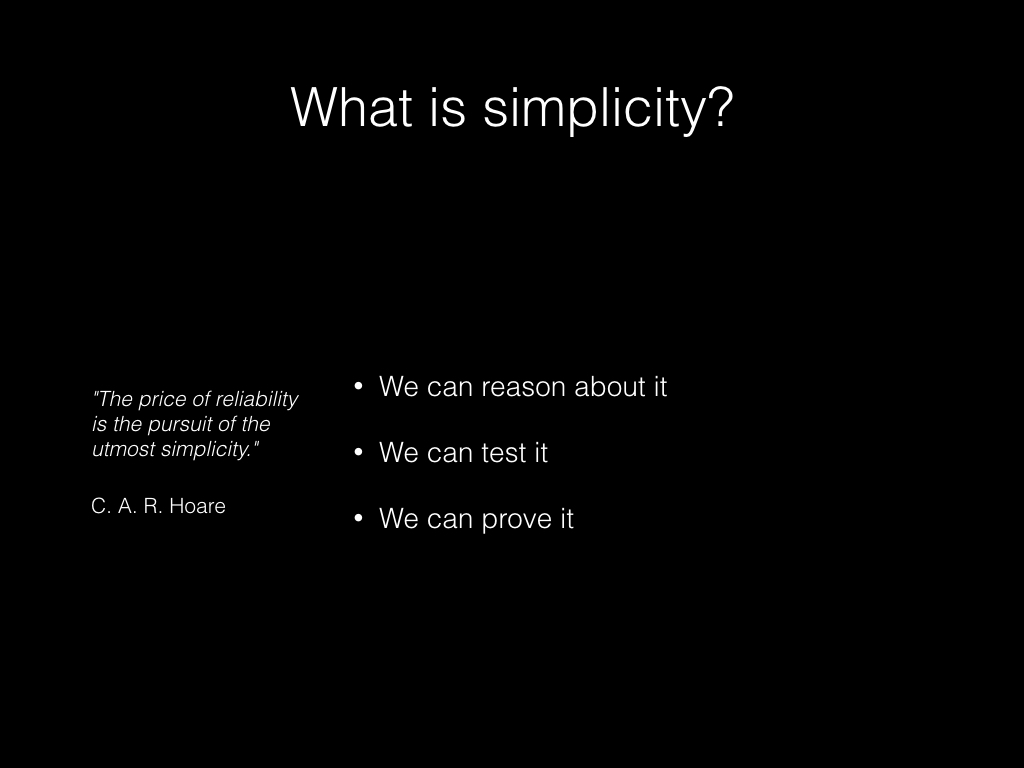
If we can reason about software, can test our software, and can prove our software, then we can trust our software.
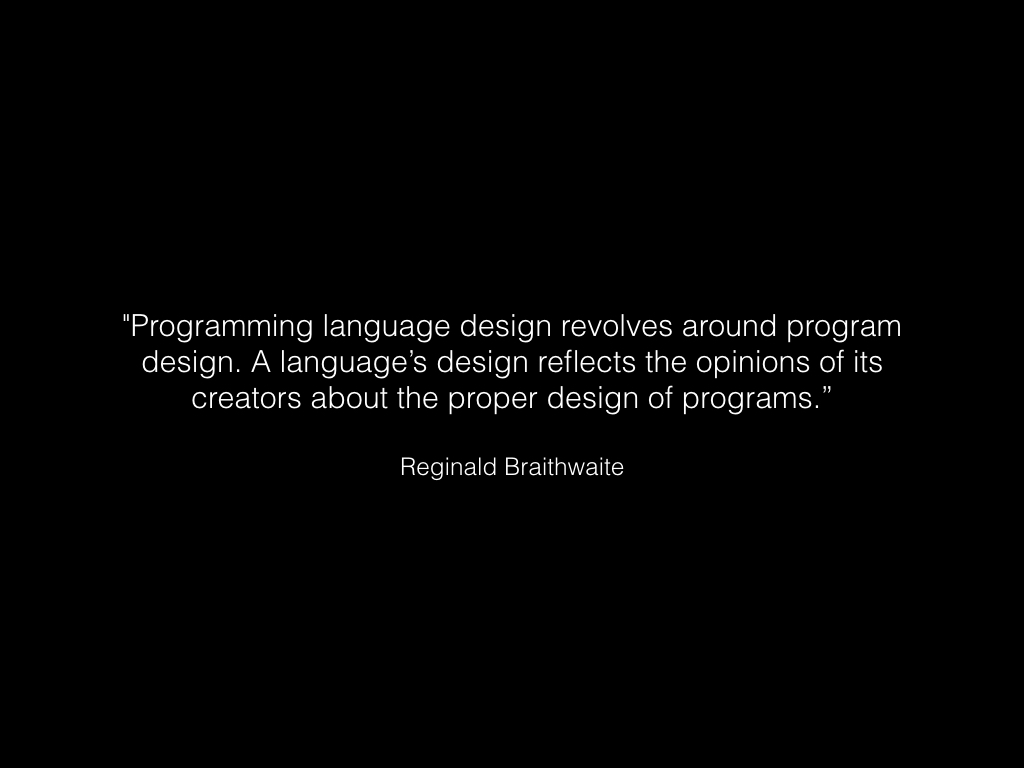
The language we use influences the design of our code. It changes the way we think. Alan Perlis says "A language that doesn't affect the way you think about programming is not worth knowing."
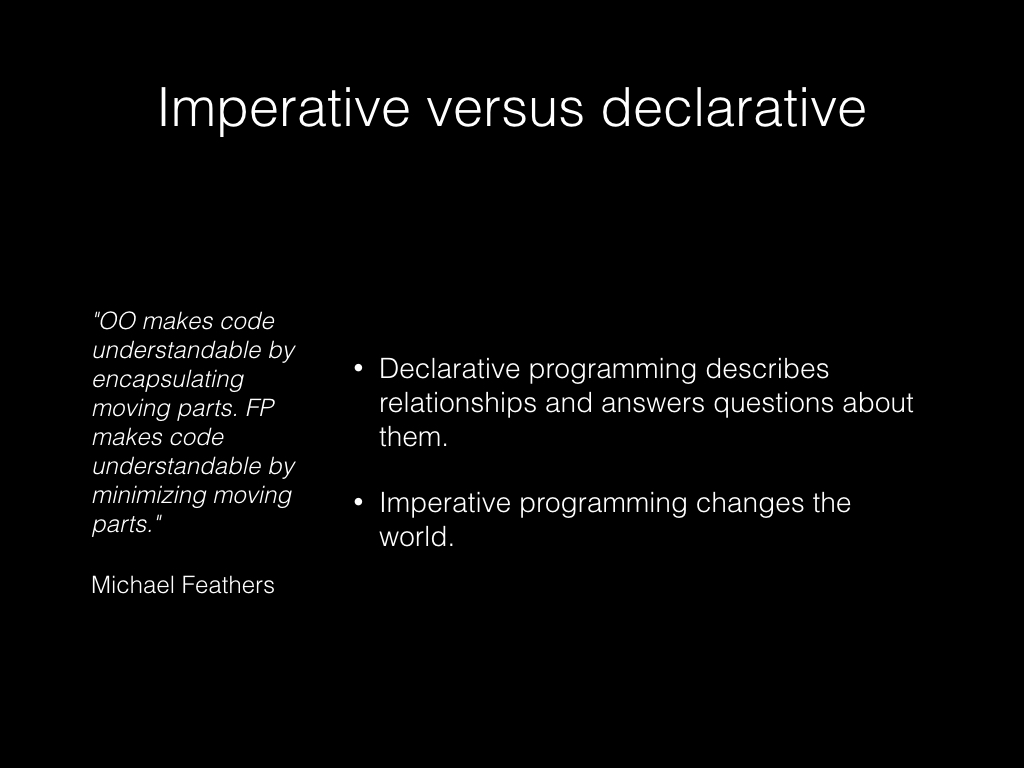
Imperative and declarative communication patterns
Imperative programming changes the state of something in the world, or at least in a program's model of the world.
- Could be the state of a variable.
- Could be the state of a user's screen.
- Could be the state of a servo controlling the ailerons on an ICBM.
Declarative programming describes relationships and then answers questions about them
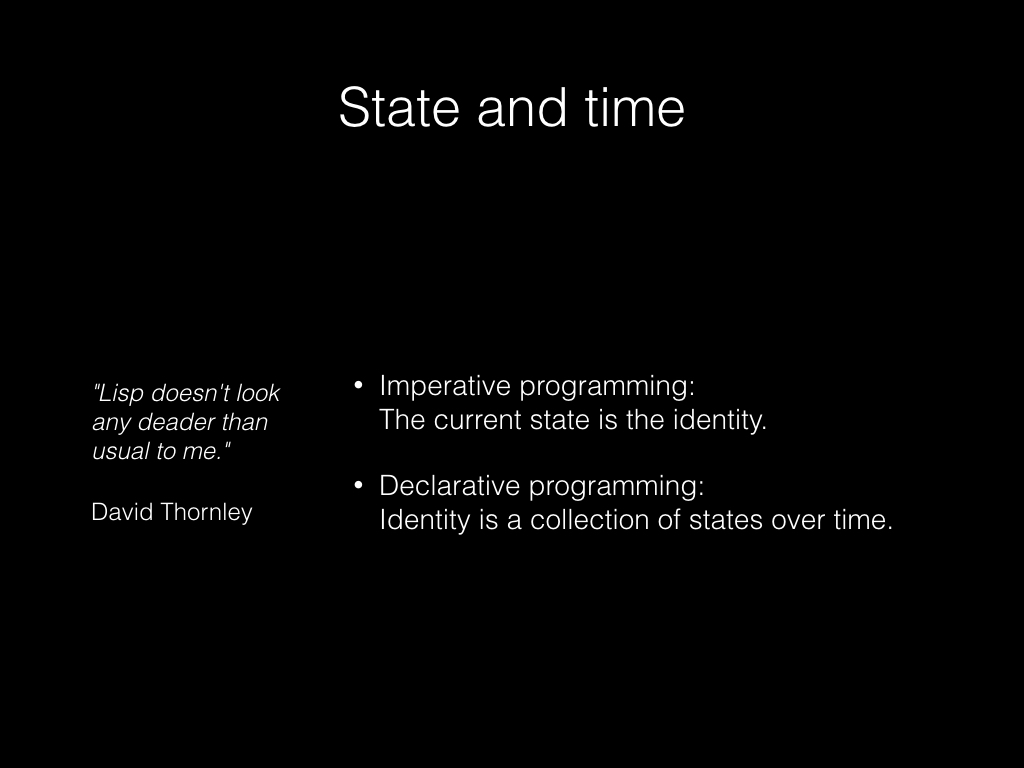
In imperative languages, the current state typically defines identity. That state is changed by code: we say "Set X to 2." Identity is timeless; the only state we can get from it is "now". When we have multiple parts of the code changing state, as complexity increases it can be difficult to guess what values we'll get.
In declarative languages, state doesn't change because values don't change. We don't say that the value of a variable changes any more than we'd say the value of 1 changes. Identity is a collection of states, each transformed into the next, passed to a function or an actor only when a transformation is needed. Time is inherent; even if we throw out previous states, they still existed as separate entities.
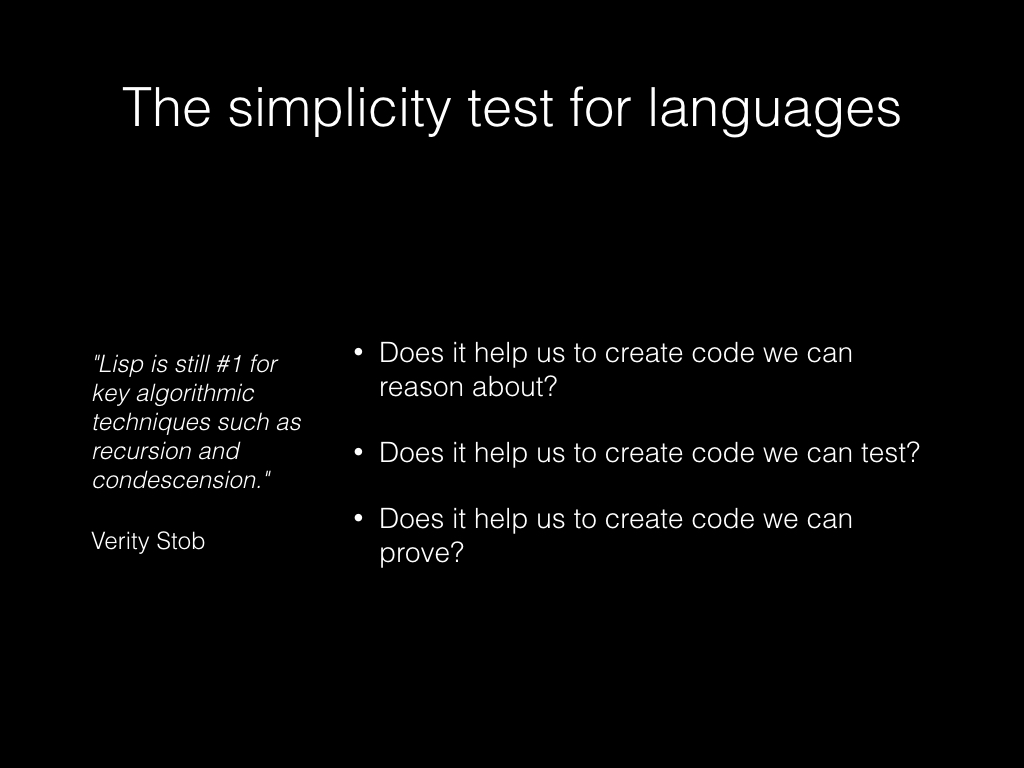
We don't move from simple to complex. Our job is to control complexity, to model an inherently complex world in the simplest possible ways. Languages can help us do that.
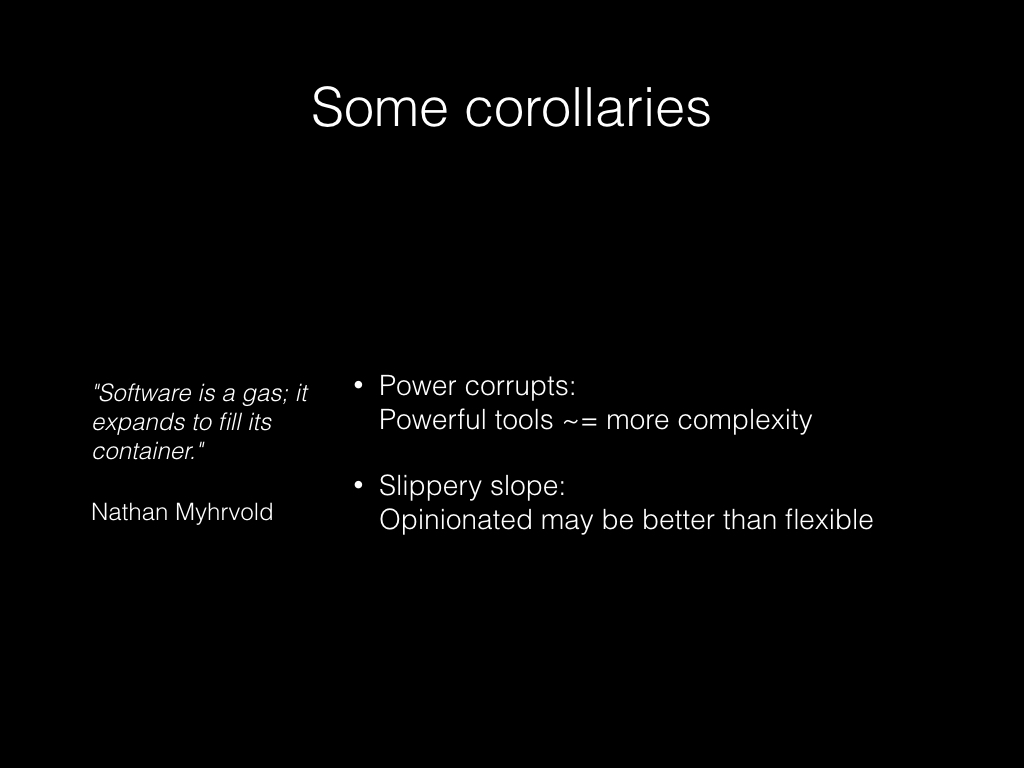
Power corrupts. The ability to allocate memory, manipulate pointers, or manage garbage collection is sometimes needed, but on the whole it leads to a more complex system, not a simpler one.
Flexibility is a slippery slope. An unopinionated programming language might let you choose to be declarative or imperative, to mutate or not, to use functions or classes. The result is that you have the flexibility to build more complex systems.
There are exceptions, of course. We typically use lower level, flexible, powerful languages to build opinionated, more restrained languages. My favorite geeky tee-shirt is probably the one that reads "My compiler compiled your compiler."
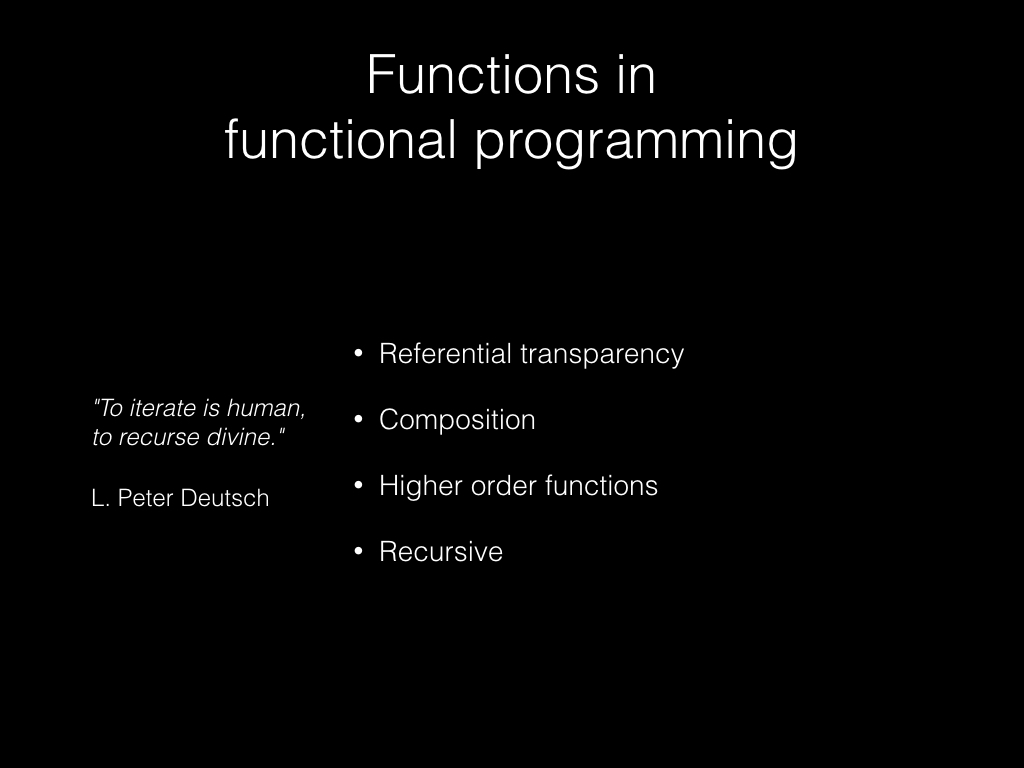
Almost every programming language has functions. In functional programming, functions are the stars, not the supporting players.
Pure functions have exactly one result for any given input and do not generate side-effects. The result of a call to a pure function can replace the call itself for any given value (referential transparency).
Functions can be made of functions (composition), and have functions passed to them as inputs (higher order functions).
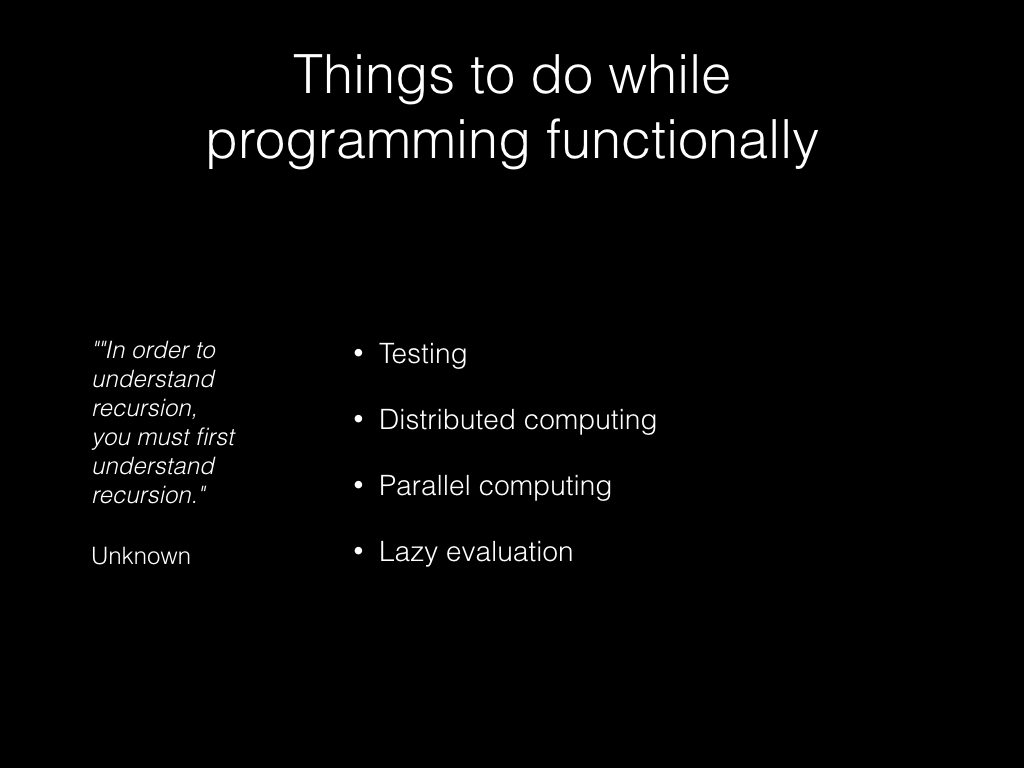
Testing pure functions is super easy. Your inputs are known, your outputs don't change unless your inputs do, and you don't rely on mutable state to calculate a result. Look Ma, no mocks!
Distributing pure functions is super easy. Because a pure function will always return the same value when given the same inputs, it makes no difference where we run it.
Parallelizing pure functions is super easy. Two functions that don't rely on the output from each other can always run in parallel.
Even faster than parallizing functions is to never run them. We don't have to evaluate a function before it's needed.

Can we reason about it? Yes. You have an input, and you have an output, and the same input always generates the same output. If the essential complexity of a function is significant, we can build that function out of smaller, simpler functions.
Can we test it? Yes. You have an input, and you have an output, and the same input always generates the same output.
Can we prove it? Maybe. Functional programming is based on Lambda calculus and as such, follows a provable theorem. In fact, both Lambda calculus and Turing machines were created in large part as a way to determine whether a calculation is computable. Turns out it is possible to write functions that will never return, and it isn't always be possible to tell the difference between a function that will never return, and one that just hasn't returned yet. Then there's the complexity of the software itself still. A short function may be provable. A long program may also be provable, given infinite amount of time and effort.
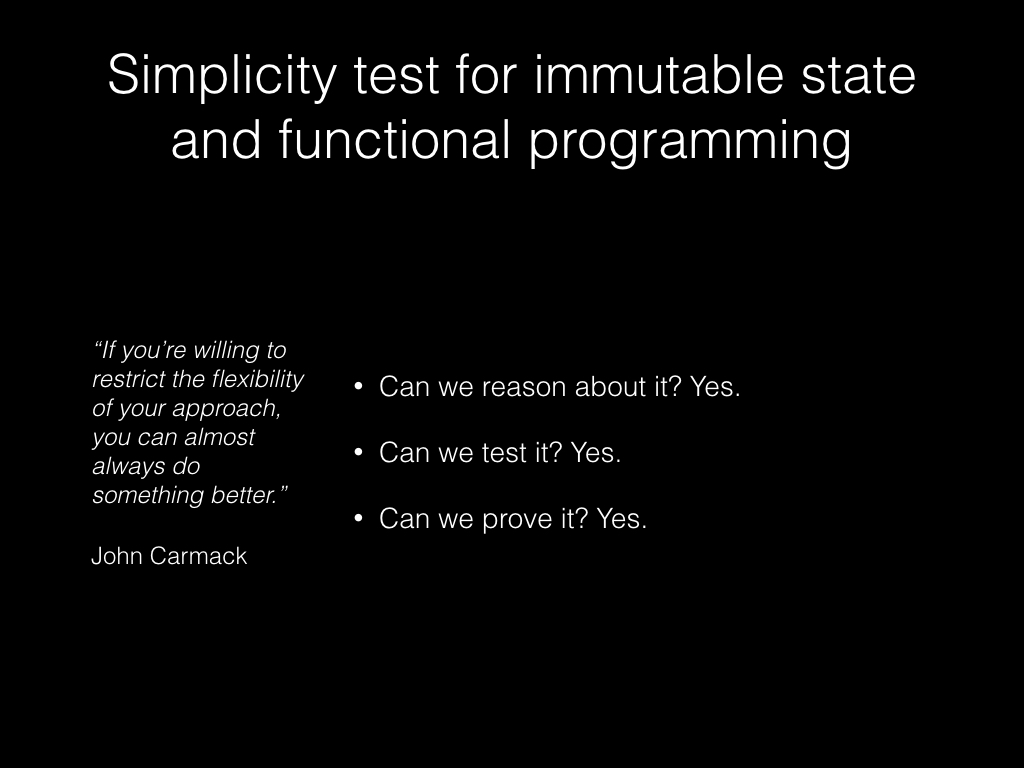
We've already discussed mutable and immutable state. Let's run immutable state through our simplicity test.
Can we reason about it? Yes, because state is typically an input to, and an output from a function, and we can reason about the functions.
Can we test it? Yes, see above.
Can we prove it? Yes, at least to the extent we can prove our functions are correct.
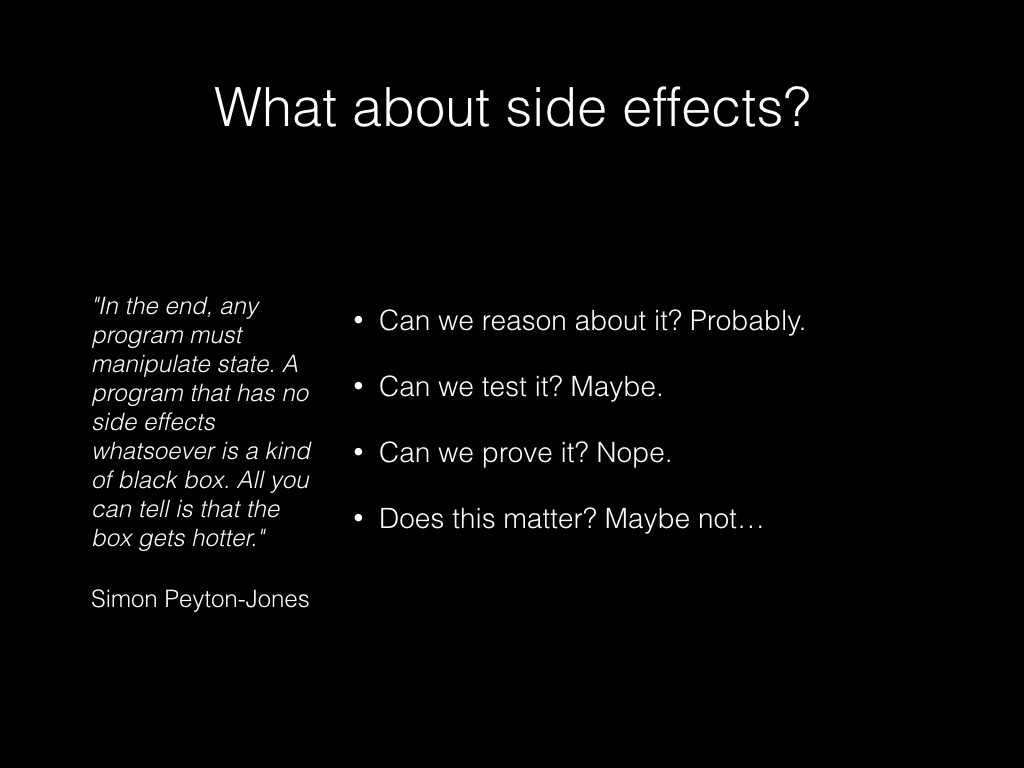
We need side effects. To have side effects is to change the world. Sooner or later we want to change the world. The thing is to do your side effects as late as possible.
One strategy is to have an imperative shell wrapped around a functional core. In the core, do everything you can do functionally. In the shell, do only side effects.
Simplicity test:
Can we reason about it? Yes, we can often reason about it.
Can we test it? Not really, but we can mock up how we think the external world is going to work and see how our programs interact with that. By isolating our side effects and imperative programming, we limit the amount of work we need to do mocking the real world.
Can we prove it? Nope. This is a characteristic of imperative anything. You can imperatively insist on stuff all day long, but in the end, we don't run the world.
Does it matter? If our imperative shell is providing a minimal interface between our functional program and the rest of the world, chances are good we will be able to trust our imperative code based solely on informal reasoning.
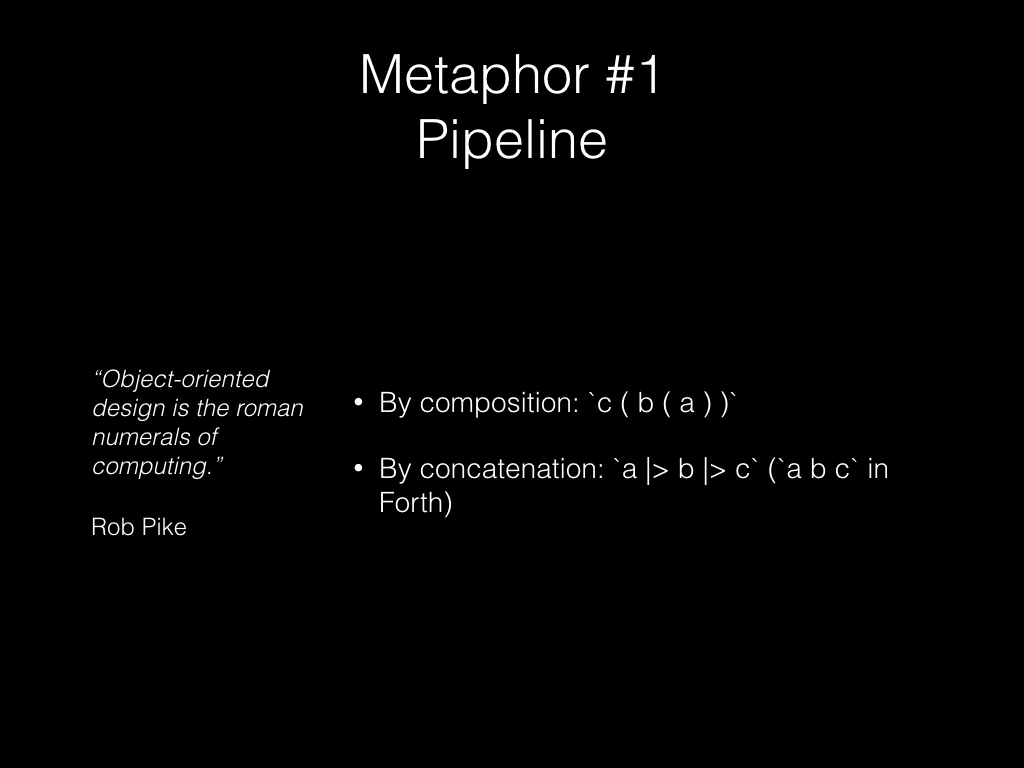
Before we finish, let's talk about how to think about programming in a functional language.
With object oriented languages, we have a consistent overarching metaphor. There's no similar master metaphor for functional programming, but here are some that get us started.
Pipelines are really just function composition. This is the basis of functional programming; we build programs from larger functions built of smaller functions. It's functions all the way down.
Many functional programming languages support concatenation as well as composition. The first example is in Elixir, and the second is Forth.
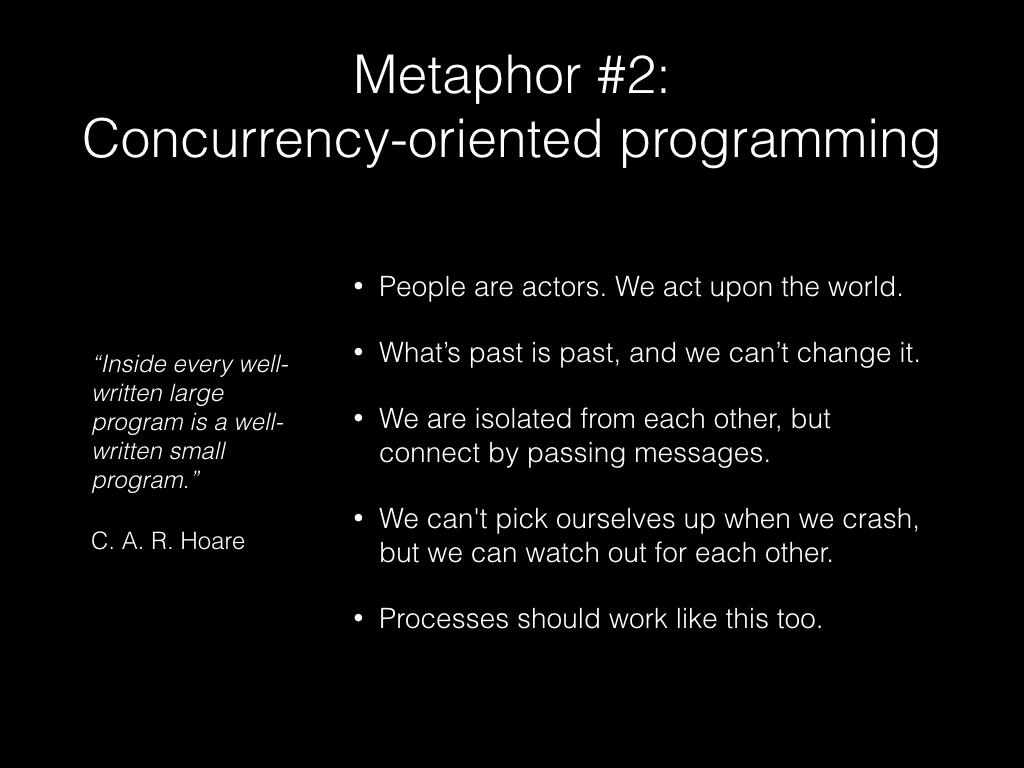
Concurrency-oriented programming is defined by Robert Armstrong, one of the creators of Erlang.
COPLs must support processes, which can be thought of as a self-contained virtual machine.
Several processes operating on the same machine must be strongly isolated, so that a fault in one process shouldn't adversely affect another process unless that's the behavior we want - one process to detect failure in another process, and know why.
Each process must be identified by a unique unforgeable identifier. We will call this the Pid of the process.
Processes don't share state, they send messages. If you know the Pid of a process then you can send a message to the process. BUT message passing is assumed to be unreliable with no guarantee of delivery.
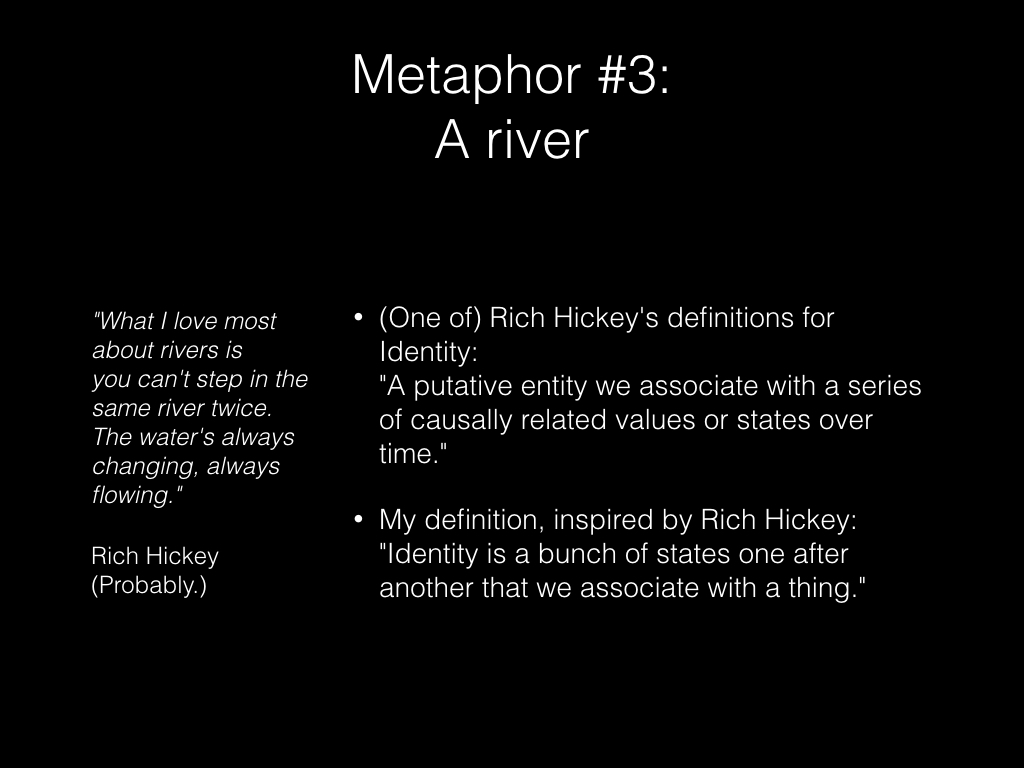
Many programs model things in the real world, so they need to support identity.
(One of) Rich Hickey's definitions for Identity: "A putative entity we associate with a series of causally related values or states over time."
My definition, inspired by Rich Hickey: "Identity is a bunch of states over time that we associate with a thing."
Hickey's metaphor doesn't see the world as "becoming" in the way the catepillar becomes a beautiful butterfly. I think he sees it as being a series of unchangeable states over time, that we for our own convenience as beings stuck moving in a single direction and constant speed along the 'time' axis tend to think of as discrete objects. In Hickey's universe, not only is he unbound by time, but he can see how each thing can have its own timeline.
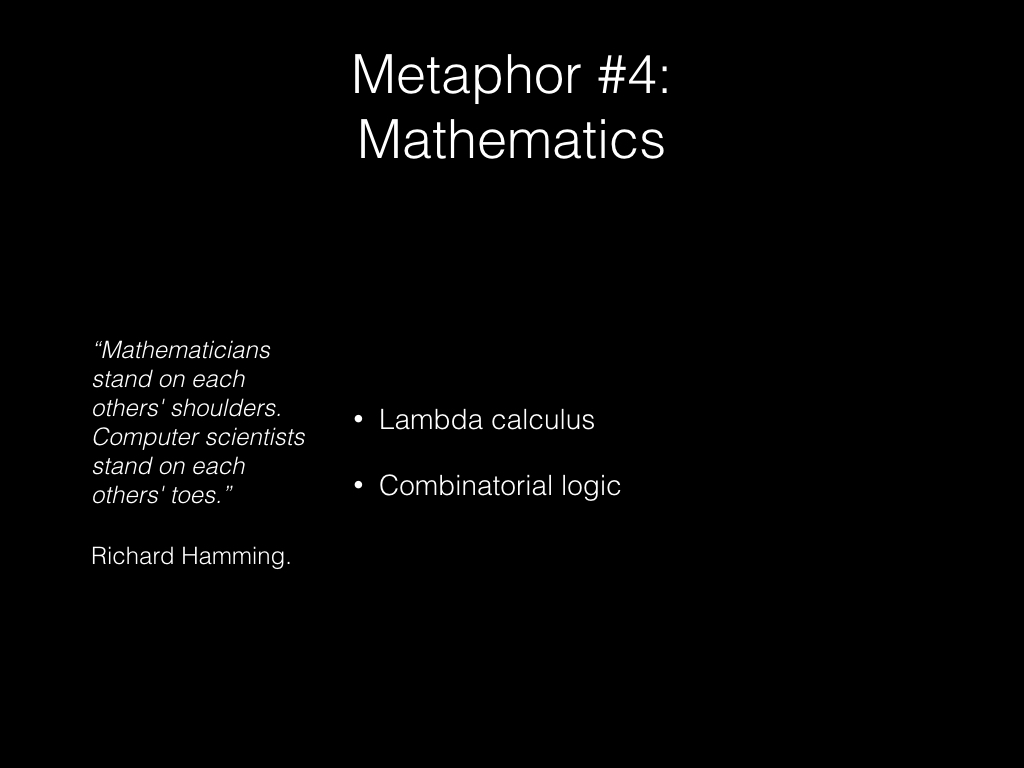
Without getting into specifics, lambda calculus is the basis of most of our functional programming languages. A few, like Forth, Joy, Factor, and Cat, and more based on combinatorial logic.
In fact, when McCarthy wrote about his ideas for Lisp in 1958, he was defining a computing machine that would implement Alonzo Church's lambda calculus.
Shortly after that, Steve Russell - incidentally, the guy who created the world's first video game - went to McCarthy and said he thought he could implement McCarthy's ideas on an IBM 704 computer. McCarthy told him he was confusing theory with practice and that it couldn't be done. So Russell went and did it, and that is how Lisp was born.
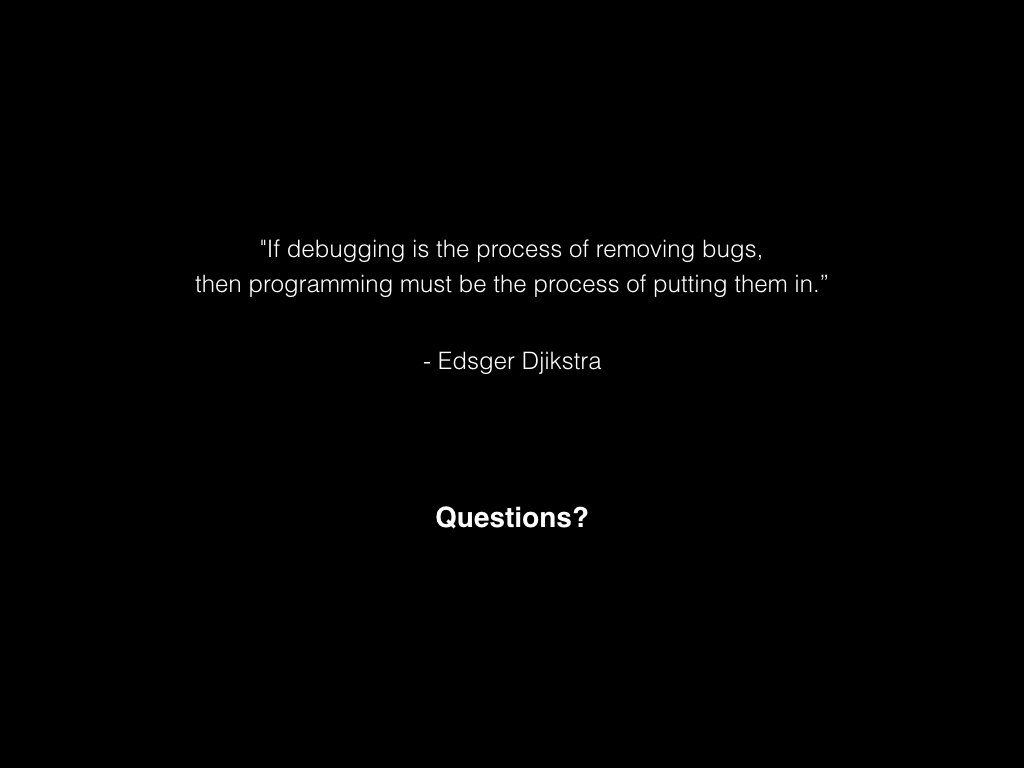
Talk back to me
You can comment below. Or tweet at me. I'm always open to a good conversation.